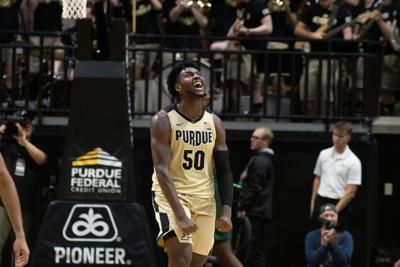The NCAA broke new ground Wednesday with a stark change in ruling.
NCAA says college athletes will be able to benefit from their name, image and likeness beginning Thursday.
— Shams Charania (@ShamsCharania) June 30, 2021
For the first time, the more than 480,000 athletes who play across three divisions will be able to profit off their name, image and likeness without losing their eligibility.
Athletes will be able to take sponsorship deals, be featured in products and advertisements, and use their name or personal appearance to to promote the sale of products, according to the NCAA.
“This is an important day for college athletes since they all are now able to take advantage of name, image and likeness opportunities,” NCAA President Mark Emmert told the Associated Press.
One of the most commonly known legal battles for athletes' control over their name, image and likeness began in 2014, when former UCLA forward Ed O'Bannon filed a lawsuit against the NCAA for using his likeness in Electronic Arts' "NCAA Basketball '09." The hard-fought case lasted for five years in the 9th District Court and two more in the U.S. Supreme Court, sparking controversy over what it meant to be an "amateur" athlete and whether the association broke antitrust laws by using their students' name, image and likeness rights, according to Sports Illustrated.
Although O'Bannon won his case in the 9th Circuit, his case was denied by the Supreme Court in 2016.
The NCAA features some of the most profitable leagues in sports. Through TV deals, sponsorships and sports betting, March Madness brought in $933 million for the NCAA in 2020 alone, according to Yahoo Life. The association is in the 11th year of a 14-year, $10.8 billion broadcasting deal with CBS Sports.
A small portion of their own revenue, O'Bannon argued, would drastically help students in paying for the basic necessities not covered by their scholarships.
“If you live off campus, where does that go?” O’Bannon told the Undefeated. “Probably to rent or groceries. After rent, groceries and gas and your insurance on your car, where are you?
“I’m not saying half a million dollars (in compensation), but I am saying something significantly more than they are getting so they can take care of those things.”
One of the main issues critics had with the ruling was an athlete's ability to "play for pay," or choosing a school based on the incentives they would provide. Such acts violated anti-trust laws, Emmert said, and will continue to be monitored even with the recent ruling.
Today’s the day! DMs are open! pic.twitter.com/fVYWGFgJzE
— Eric Hunter Jr. (@ebuckets2_) July 1, 2021
Any local businesses/companies/brands looking to do some business with me please reach out! Excited to work with some people and reach a bigger audience! 🚂
— Sasha Stefanovic (@Sash_Stefanovic) July 1, 2021
“The new policy preserves the fact college sports are not pay-for-play,” Sandra Jordan, Division II Presidents Council chair and chancellor at the University of South Carolina-Aiken, told the Associated Press. “It also reinforces key principles of fairness and integrity across the NCAA and maintains rules prohibiting improper recruiting inducements.”



(0) comments
Welcome to the discussion.
Log In
Keep it Clean. Please avoid obscene, vulgar, lewd, racist or sexually-oriented language.
PLEASE TURN OFF YOUR CAPS LOCK.
Don't Threaten. Threats of harming another person will not be tolerated.
Be Truthful. Don't knowingly lie about anyone or anything.
Be Nice. No racism, sexism or any sort of -ism that is degrading to another person.
Be Proactive. Use the 'Report' link on each comment to let us know of abusive posts.
Share with Us. We'd love to hear eyewitness accounts, the history behind an article.